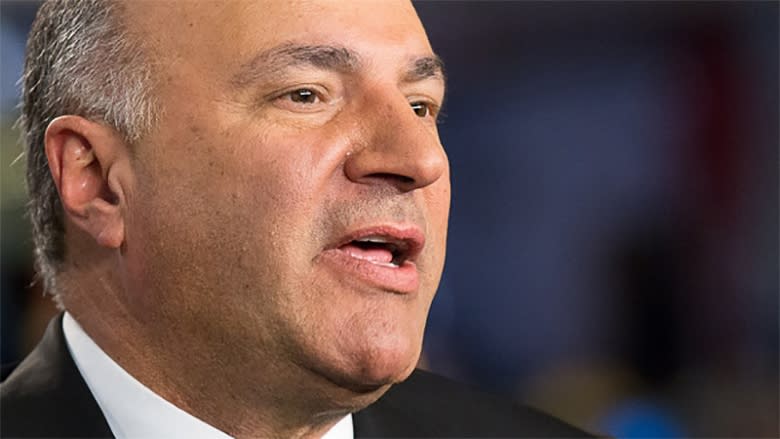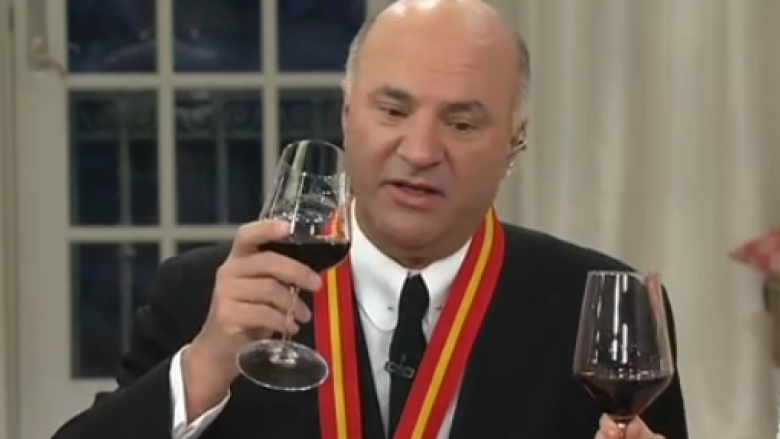Gun gaffes and French fracas: Kevin O'Leary's short, colourful Conservative leadership campaign
Branded an interloper, loudmouth and self-promoter, Kevin O'Leary's entry into the Conservative leadership race was a brief, and at times bizarre, few months in Canadian politics.
He was a latecomer when he officially jumped in to the race in January, joining an already crowded field of candidates, some of them eager to discredit the reality TV celebrity.
Even before he registered, rival Lisa Raitt, a former cabinet minister under Stephen Harper, lambasted O'Leary in a news conference, warning his Donald Trump-style tactics would divide the Conservative Party and ruin any chance of its return to power.
"If principled and pragmatic Conservatives don't join together, we will see our party hijacked by the loudest voice in the room," she warned.
Raitt launched a website dedicated to stopping the business mogul and Shark Tank star.
The timing of O'Leary making his candidacy official was also criticized and he was accused of dodging the first French-language debate by delaying his entry.
Lack of French problem
Since then, questions about his ability to communicate with francophones in Quebec and other parts of the country have dogged his campaign.
An anglophone born in Quebec, O'Leary admitted he was "terrible" at French but insisted he spoke "the language of jobs and the economy." He brushed up on his French skills and was able to read from prepared written statements, but was not able to converse.
But language proficiency wasn't his only hurdle.
He became the main target of attacks from rival candidates during debates, who accused him of being an abrasive outsider without real conservative roots or credentials.
He also faced character attacks from outside the party, including a broadside by his former Dragon's Den co-host Arlene Dickinson, who accused him of a "total lack of empathy" for Canadians who put their heart and soul on the line.
"Kevin is funny. I often enjoyed a glass of wine with him. He's also intelligent and a savvy self-promoter," she wrote in an opinion column for CBC News. "But at his core, he's an opportunist. He doesn't do anything that doesn't offer a path to power, fame or fortune — and that should have us all afraid."
Another former Dragon's Den personality, Brett Wilson, defended O'Leary, calling that criticism "misguided."
While he might be a "little politically incorrect," O'Leary is willing to take on tough issues without kowtowing to the vocal minority, Wilson said in an interview with CBC.
Media attention
The O'Leary campaign attracted much media attention, in part for gaffes along the way.
He faced an angry backlash for posting a video of himself shooting a handgun and other automatic weapons on his social media accounts on the same afternoon a public funeral service was underway for three of the six victims of the Quebec City mosque attack.
The posts were quickly pulled and his spokesperson apologized for the mistake, but damage was done. Public Safety Minister Ralph Goodale called it "obviously crass, insensitive and exceedingly dumb."
He faced more accusations of not being a serious contender when he took time off the campaign to peddle his own wines on an American home shopping channel.
In March, he accused backroom organizers of using prepaid credit cards to sign up "fake members" in a widespread vote-rigging scheme. He was vindicated when the party, after what it called an "expedited review," removed 1,351 names from its membership list after discovering they were purchased anonymously and inappropriately.
Throughout it all, O'Leary, nicknamed Mr. Wonderful, held steady as a front-runner in the race.
But he ultimately concluded he couldn't overcome his poor foothold in Quebec, did the math, and realized he couldn't beat Prime Minister Justin Trudeau, the man he once labelled a "surfer dude," in the next election.
O'Leary left the race Wednesday with a frank admission that he was bowing out and throwing his support behind former cabinet minister Maxime Bernier. He said it would be foolish, even selfish, to pursue the leadership knowing he does not have the path or probability of winning the next federal election.
Peter Loewen, director of the School of Public Policy and Governance at the University of Toronto, called that candid concession "refreshing."
"I am not sure his heart was always in it, and it's hard to win a leadership," he told CBC. "But he could have gone out with much less class and much more bluster. He was quite clear about the failures of his campaign today. That's nice to see."
'Concocted excuse'
But Michael Behiels, a political historian at the University of Ottawa, said Quebec was never O'Leary's primary problem.
"This is a concocted excuse for why he precipitously dropped out. (Stephen) Harper won his majority without Quebec and O'Leary hoped to repeat this trick," he said.
Behiels said O'Leary "bailing" from the race does not bode well for a party striving to rebuild after the 2015 electoral defeat.



